A friend of mine– who we’ll call David to avoid any embarrassment– recently came to me with a classic story of SEO woe. David is a small business owner who’s struggling to rank in a competitive market.
He is very familiar with the pot of gold that awaits him at the top of Google search results. However, right now, he’s spending a lot of time chasing keywords that are far too difficult for his website despite having a low difficulty score on traditional keyword difficulty tools.
David has found that just because a tool has identified a keyword as “easy” it doesn’t necessarily mean it’s easy for his website. Time and again, he hopes to get some significant traffic from a new keyword he’s targeted but fails to see the fruits of his labor.
Like many small business owners, David would like to spend less time chasing impossible keywords and more time on important things, like building his website authority. Rather than an arbitrary difficulty score, he needs to answer the essential question: “Will I rank for this?”
Where Most Keyword Difficulty Tools Fall Flat
In a nutshell, keyword difficulty is a lot more complicated than it looks.
As Google uses hundreds of different factors to determine rank, it’s impossible to predict keyword difficulty with 100% without having access to Google’s ranking algorithms. Since there are a lot of great studies done on the topic, I’d rather not get into too much of the nitty-gritty surrounding the accuracy of keyword difficulty tools. The key thing to keep in mind is that even the best keyword difficulty tool can’t be entirely accurate.
Many keyword difficulty tools focus on a few of the most critical metrics to produce a score according to how ‘easy’ or ‘hard’ it is to rank for that particular keyword. Keywords are analyzed based on absolute difficulty, or the notion that a keyword can maintain the same score regardless of content, context, or industry.
However, that’s not to say that these aren’t some powerful tools. Traditional keyword difficulty tools can be an excellent resource– and we use them on occasion to supplement our own keyword research.
But take these difficulty scores with a grain of salt. You will become frustrated when you discover that ‘easy’ doesn’t apply to everyone.
The problem is these tools do not take into account your website, how many links you already have, how much relevant content you’ve got, etc. “Is this keyword hard or easy?” isn’t even a relevant question; the real question is “can my website rank for this?” The first doesn’t necessarily determine the second. So how do you check keyword difficulty?
To put this in context, let’s assume that David sells comic books online. Other keyword difficulty tools will tell him that both ‘the amazing spider-man comic books’ and something he doesn’t currently sell, ‘harry potter chapter books’ both have the similar keyword difficulty scores. Seems impossible, right? Knowing everything we know about how Google values content, backlinks, and anchor text, how could David easily rank for something he doesn’t sell or often write about?
Keyword Difficulty: It’s All Relative
Most likely, your website is awesome– it’s interesting, informative, a shining beacon of future success, and most importantly, it’s unique.
In other words, much like you, Google ‘sees’ your website as different than the others. Remember those hundreds of ranking factors I mentioned earlier? They definitely matter. In all reality, you and your competitors satisfy very different factors.
You have strengths and weaknesses that are exclusive to you. Maybe you’ve already written 50 articles on a similar theme, or you’ve got a ton of relevant anchor text, perhaps the keyword is in your domain name, and finally, it’s possible that you’ve got some nice related rankings. All of these things matter and they affect keyword difficulty.
So, how could an absolute keyword difficulty score accurately predict your success with that keyword, when it doesn’t know just how great your site is?
Are you an expert on the topic?
Pretend that David wants to rank for both ‘the amazing spider man comic’ and ‘harry potter chapter books,’ his results would look something like this:
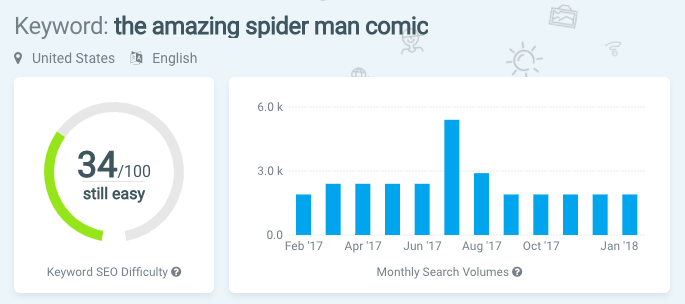
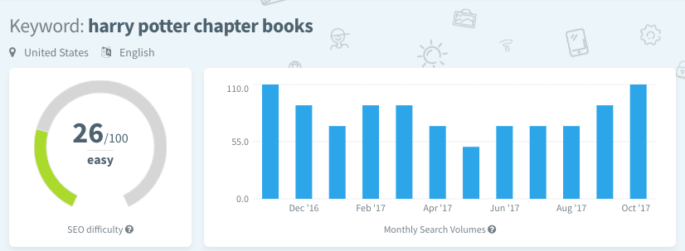
Whoa, that’s easy! It looks like David can sell his Spider-Man and his Harry Potter all in the same place, no problem, right? Wrong.
As it happens, a website with many pages focused on the same topic area will have an easier time ranking for keywords related to that issue than a website on an unrelated topic. When many pages are focused on the same subject, targeting similar keywords, it signals to Google that the site is structured around a coherent theme.
That is, Google sees you as an expert on this topic… and they really like experts over at Google. Over time, this makes it easier to rank for specific keywords.
In David’s case, he has some mid-level feature pages that include variations of the keyword ‘the amazing spider-man comic’ ( t-shirts, collectors editions, figurines, etc.). The search engines are more likely to see that David knows his stuff when it comes to Spider-Man comic books.
While he has an affinity for Harry Potter, as a comic book store, David currently does not sell Harry Potter chapter books or chapter books of any kind. David in the eyes of Google is unknown in the Harry Potter arena, and not an expert at all.
Doesn’t it make sense that it would be quite difficult for David to rank for ‘harry potter chapter books’ but not so much for ‘the amazing spider-man comic’?
This is not to say that David can never rank for ‘harry potter chapter books,’ with some effort and additional supporting content, he likely can rank over time. It just might not be as ‘easy’ as many keyword difficulty tools would have you believe.
It’s better that David spends time on higher value keywords that are more relevant to his website (such as ‘the amazing spider-man comic’).
Do you have a bunch of anchor text with this keyword already?
While we all love David, and I’m sure you can’t wait to find out about Harry Potter and comic books, in order to accurately highlight this next point I’m going to have to shift gears a bit.
After some research, I’ve decided to target the keyword ‘rank tracking’ in an upcoming blog post for CanIRank. After a quick look at some keyword difficulty tools, I found my target keyword is pretty difficult (70-80% depending which tool you check). I know what you’re probably all thinking– cross that one off your list, bud. It’s way too hard.
Hold your horses there Negative Nancy.
![]()
If you take a look at our site, you’ll find that CanIRank doesn’t offer a rank tracker. Which generally would mean that ranking for this high search volume keyword would be pretty challenging regardless of what keyword difficulty tool you’re using. But stay with me here…
We already rank for a host of ‘rank tracking’ related keywords. This is because our brand name includes the word ‘rank,’ and we have hundreds or thousands of links with that anchor text. Google sees the anchor text, and decides “hey, they must know a whole lot about rank tracking.”
Relevant external anchor text and the links you’ve already earned has a significant impact on keyword difficulty. Search engines use anchor text as a reflection of how other people view your page and for what it should rank. It’s one of the top factors thought to be used by Google to determine rankings.
So theoretically, I can write my blog post with little fear as our site already ranks for my target keyword thanks to some juicy anchor text. But, would I have known this if I had stopped after the first difficulty score? No, I wouldn’t, and that would have been a potentially valuable opportunity lost.
Is the keyword in your domain name?
Although it has been a source of debate throughout the years, many people believe the presence of a keyword phrase in the domain name is itself a ranking factor. However, recent studies have confirmed a link between websites which rank highly for a certain keyword and whether that keyword appears in its domain URL.
Meaning that once again absolute keyword difficulty scores might not be giving you the right results.
Take the CanIRank rank tracking example again. ‘Rank tracking’ was found to be très difficile for the average Joe. However, CanIRank isn’t quite the average Joe, is it? We’ve got a leg up on the competition, not just because of our anchor text but also because ‘rank’ happens to be in our domain URL.
In David’s case, he’s up against some fierce competitors in the Harry Potter field. Let’s take another look at the current rankers for ‘harry potter chapter books.’
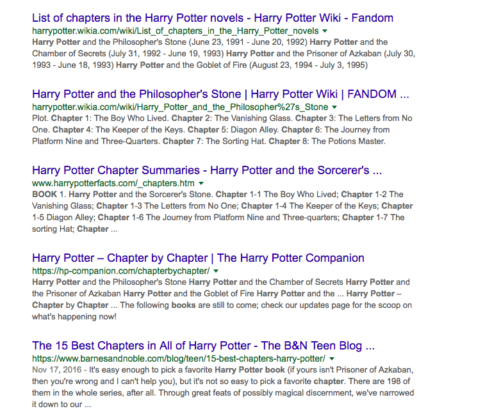
All three of the top ranking pages use part of the keyword: ‘harry potter’ in the domain URL. Even with low domain authority scores, harrypotterfacts.com and hp-companion.com both outrank Barnes and Noble. The domain name combined with relevant content tells Google that these websites are more of an expert on the topic than even industry leaders.
How can an absolute difficulty score be trusted if it doesn’t even know your domain URL?
Do you have any related rankings?
Suppose David has an article that recommends the best comics in the Spider-Man series. It could be a good article that gets a lot of traffic for its intended keyword focus, but people are also finding it on Google when they’re looking up ‘best marvel comics.’
Having identified a content gap, David decides to produce additional content that is more aligned with those particular keywords. Because Google has already recognized him as a potential authority on that topic, it is more likely that he will rank well in organic search results.
Related rankings build your reputation with Google and make it easier to rank in the future. In David’s case, a host of rankings related to ‘spider man’ will make ranking for ‘the amazing spider man comic’ or even ‘best marvel comics’ a lot easier.
However, traditional keyword difficulty tools tell him that ‘best marvel comics’ has a keyword difficulty score of 86.56%

With a higher search volume, it’s likely that this is a more difficult keyword to rank for than ‘the amazing spider man comic.’ But, is it as difficult for David as it is for Harrypotterfacts.com? Probably not.
But with a traditional keyword difficulty tool, there’s no consideration for related rankings, keyword in the URL, or relevant content. Meaning that everyone from Harrypotterfacts.com and Davidscomics.com to Amazon.com will all get the same keyword difficulty score.
The Solution
Much like Einstein, we love relativity. CanIRank is the only tool that evaluates difficulty relative to your website, based on machine learning algorithms assessing over 200 ranking factors. CanIRank is the only keyword SEO difficulty tool on the market that incorporates thematic relevancy and other AI-based signals to calculate difficulty.
In other words, we are the only tool to tell David that he has a better chance to rank for ‘the amazing spider man comic,’ than ‘harry potter chapter books.’
Relativity is Everything
As we know, David is frustrated with chasing keywords that are actually too difficult for his site. He doesn’t want the standard: ‘the amazing spider-man comic:’ 36%. He wants to know “if you write about Spider-Man comics you’ll probably rank on page 2.”
Lucky for David, rankings relative to your website make it easier to rank for the right keywords, which means no more chasing false positives. When he pops his target keyword into CanIRank’s Improve My Rankings tool his results look a bit like this:
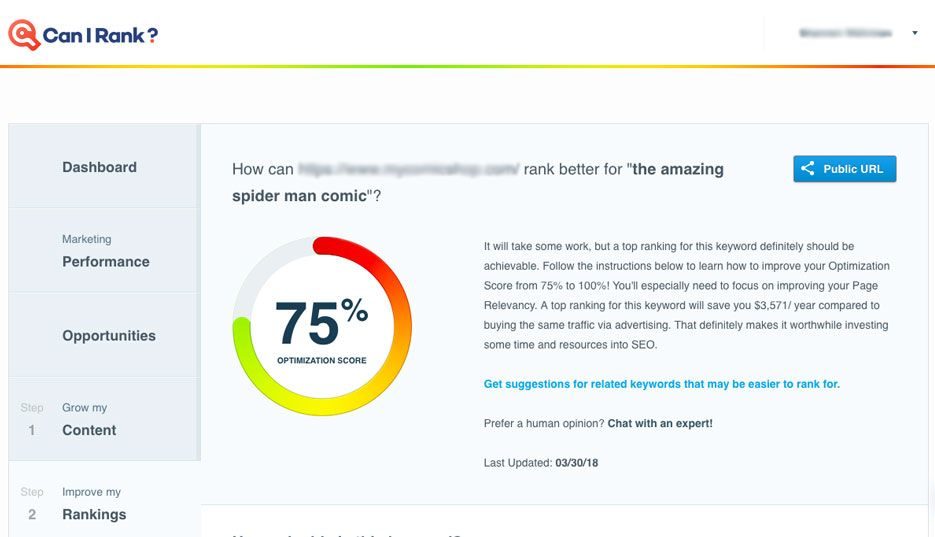
The first thing David sees is his optimization score. This score is unique to David’s website and considers the relevancy of the keyword to his business, and scores that along with the difficulty and search volume. It gives him a good idea of the amount of work he would have to devote to SEO in order to get a high ranking (or in other words, how easy or hard it is for him to rank with his current website).
CanIRank also compares David’s website with that of top rankers to determine where exactly he can improve to overtake the competition
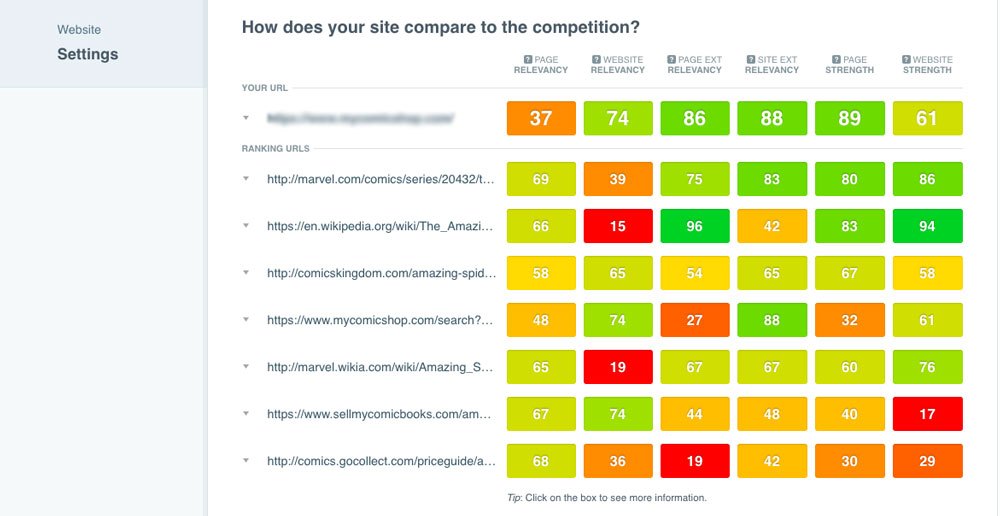
And finally, the report provides David with actionable suggestions for improvement that will help him rank for the target keyword.
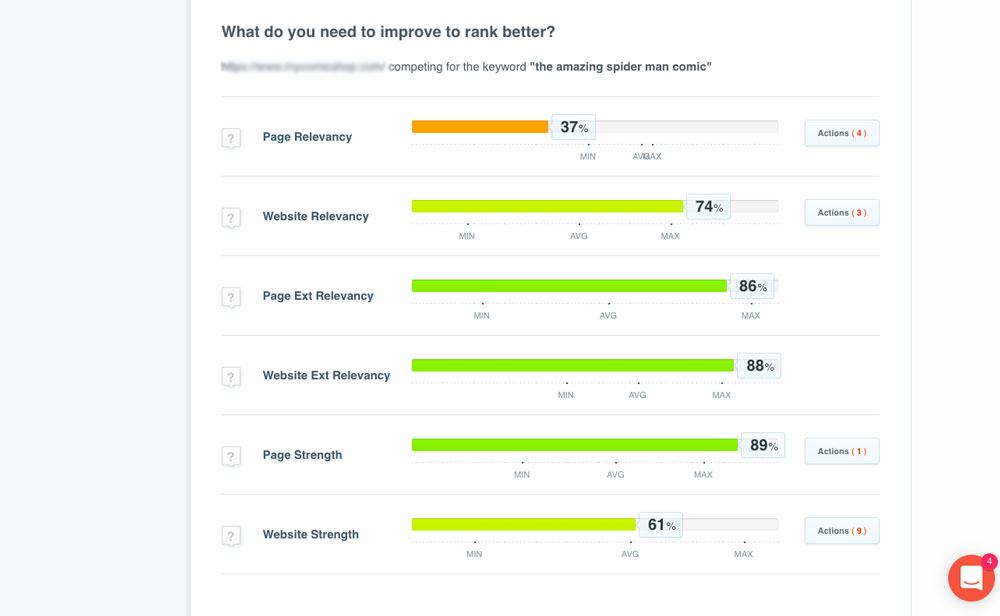
Now, compare that to ‘harry potter chapter books,’ a keyword that other tools found as easier than ‘the amazing spider-man comic.’ Clearly, this isn’t a keyword that is ‘easy’ for David and therefore not worth his time or effort.
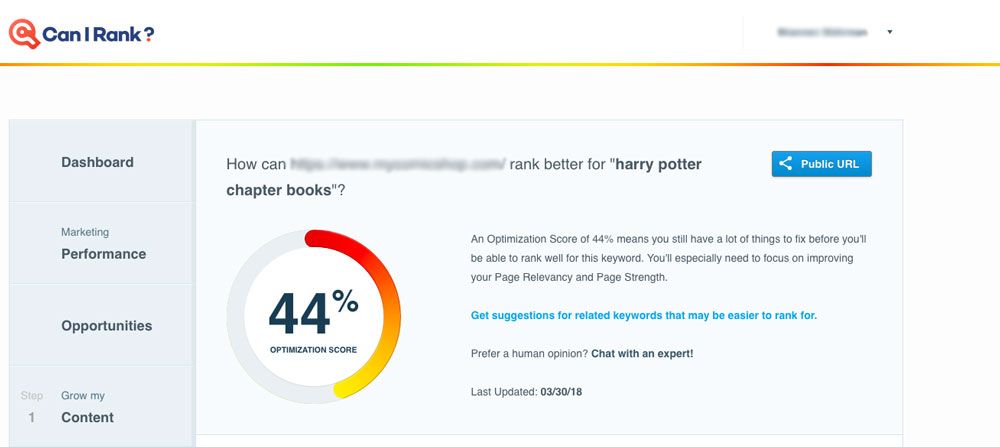
By evaluating difficulty relative to his website CanIRank has saved David from chasing yet another ‘false positive.’
We identify low hanging fruit that helps the Davids take on the Amazons
Using data relevant to your site, CanIRank suggests dozens of less competitive alternatives for your target keyword.
So, when David decides to write a new piece on his favorite Batman comics, using the keyword: ‘batman comics.’ CanIRank uses data relevant to his site to tell him:
- “hey buddy, that’s a competitive keyword so you’re really gonna have to work for it”
- “rather than chasing that keyword, why not try one of these other variations that you have a good chance of ranking for.”
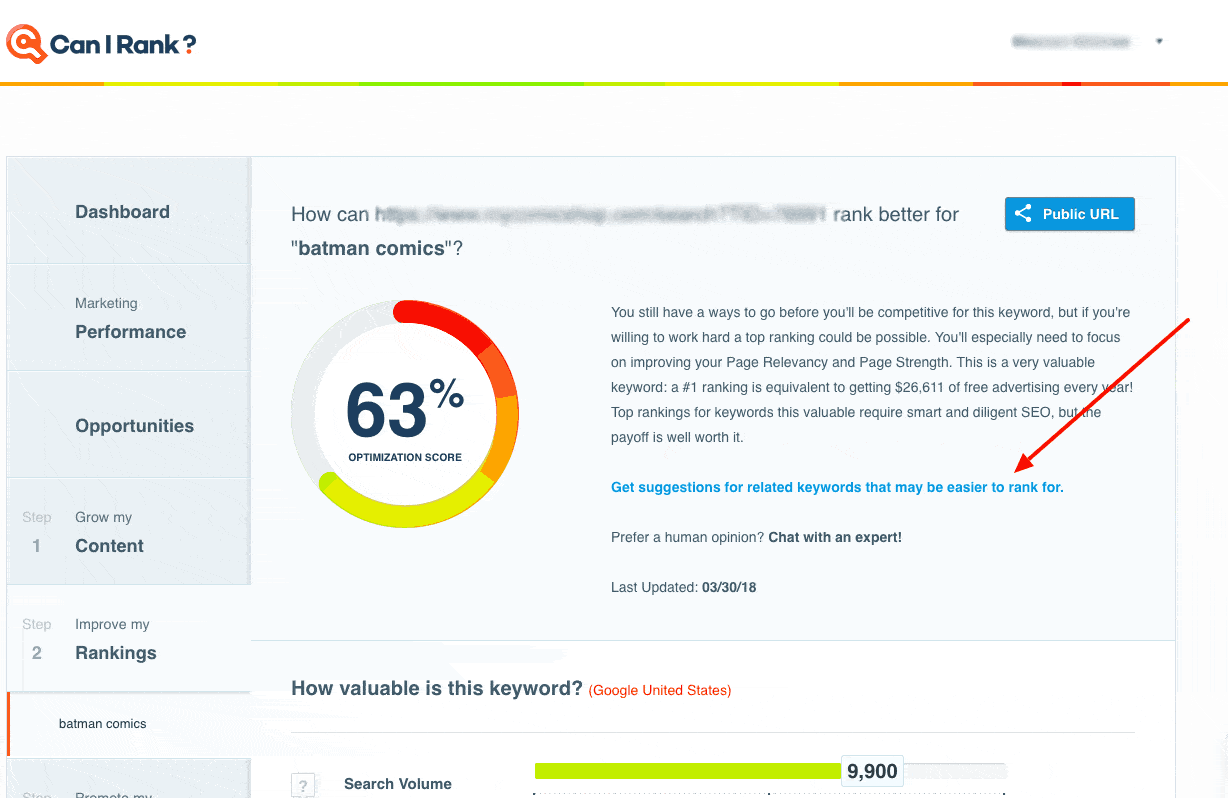
Isn’t that a lot better than a seemingly arbitrary number?
We Grow as You Do
CanIRank changes keyword recommendations over time as your site becomes more competitive or launches new product and service areas. Meaning that just because ‘harry potter chapter books’ was too competitive for David in the past it won’t always be if he launches relevant new products.
Are you chasing false positives?
Unfortunately, David’s story is not unique. A lot of SEO experts and newbies alike fall prey to the seemingly simple scores produced by traditional keyword difficulty tools. It’s frustrating, and not to mention time-consuming to continually target keywords that aren’t right for your website.
Keyword difficulty doesn’t have to be a shot in the dark, but with absolute difficulty scores, it can be just that. Rather than relying on an old school keyword difficulty tool that doesn’t even look at your website, consider how tools, such as CanIRank, use data from your site to help you uncover realistic ranking opportunities that are relative to your content, anchor text, backlink profile and more.

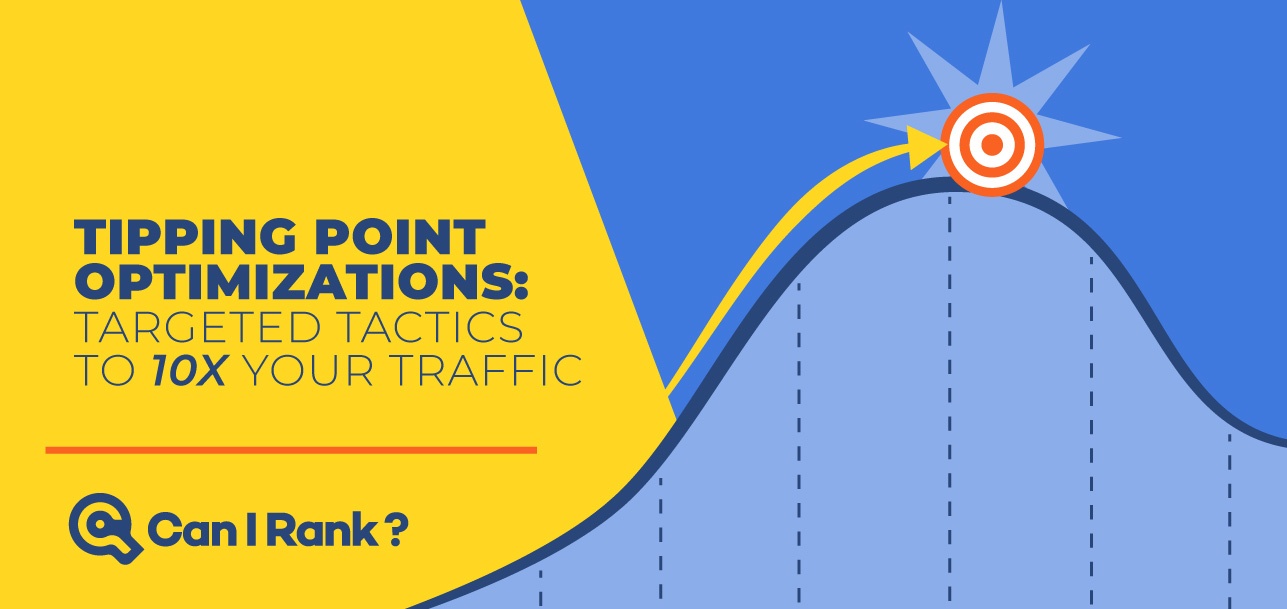
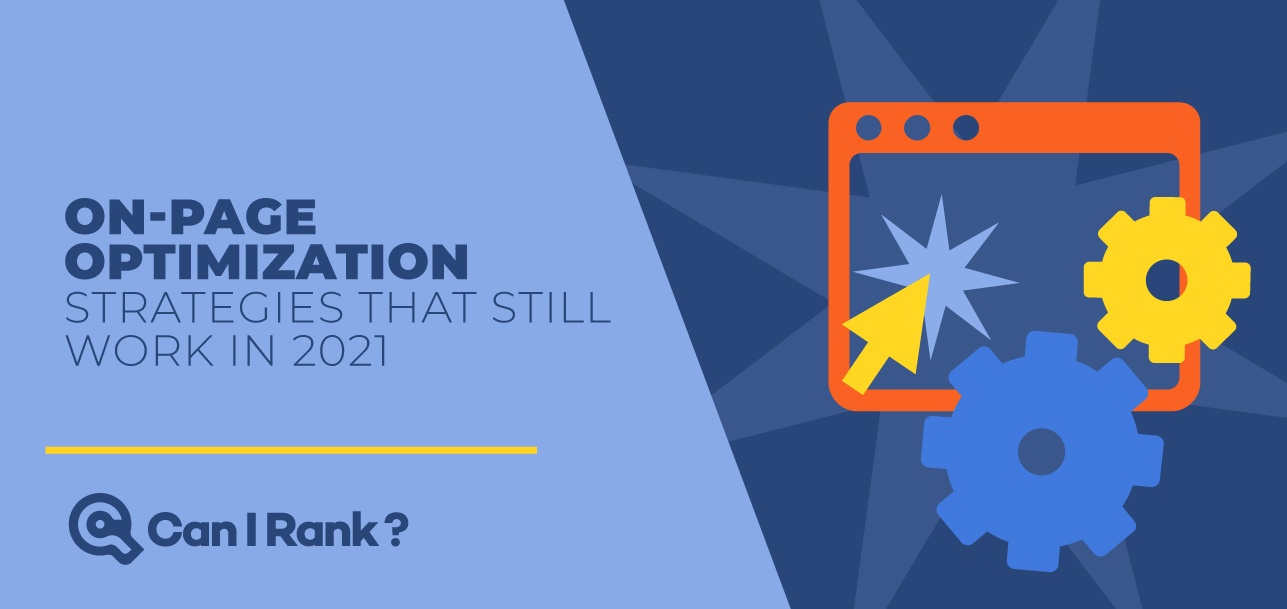

Leave A Comment